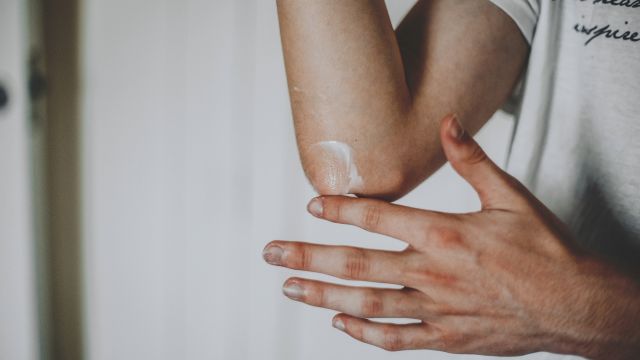Updated on February 1, 2021
An estimated 7.5 million people in the United States have some form of psoriasis, an autoimmune condition that manifests as a number of skin symptoms. The most common form of psoriasis is plaque psoriasis, which causes raised patches of dead skin cells that look like silvery scales. Red, irritated and frequently itchy, these patches often appear on the elbows, knees, scalp and the lower back, though they can appear anywhere on the body.
While there is no cure, there are a number of psoriasis treatments available to help you manage the condition. Below are four tips that may help in managing your psoriasis symptoms and reducing the frequency of flare-ups.
Moisturize
If you have psoriasis, you need to moisturize daily, especially after a bath, shower or washing your hands. Keeping skin moisturized is important to reducing itching, which is reported by many to be the most aggravating symptom of psoriasis. Moisturizing will also reduce redness and help your skin heal after a flare up.
You’ll want to look for a moisturizer that contains emollients, such as lipids and oils. Some people even use cooking oils, such as olive oil and coconut oil, as topical treatments. Look for products with phrases like “hypoallergenic,” “fragrance free,” “non-sensitizing” and “non-comedogenic”—and avoid those that contain dyes, fragrances, alcohol and chemicals, as these can irritate sensitive skin.
De-stress
Psoriasis is a stressful condition. There’s the frustration of flares occurring even when you’re following treatment, the embarrassment over visible symptoms and the stress of fitting in skincare routines, psoriasis treatments and healthcare appointments on top of everything else life demands.
Stress is a known trigger for psoriasis flares. The National Psoriasis Foundation recommends taking steps to reduce stress, such as meditating, daily exercise and if necessary, counseling or therapy. But lowering stress can be as simple as setting aside a few minutes to go for a walk, read a book, play a game or call a friend that makes you laugh.
Skip the booze
While an exact relationship between psoriasis and alcohol consumption is not fully established, research suggests that alcohol may be detrimental to managing psoriasis in a number of ways:
- Alcohol consumption promotes inflammation and immune dysfunction in the body, and there is data that suggests alcohol may trigger psoriasis symptoms or make symptoms worse.
- Alcohol may also interact with methotrexate, a common psoriasis medication, which can lead to liver damage.
- Liver damage is very dangerous. People with psoriasis are at a 60 percent greater risk of dying from an alcohol-related death than people without psoriasis, and the number one cause of alcohol-related death is liver disease.
- Excess alcohol consumption is also associated with numerous other diseases that are more common in people with psoriasis, including heart disease and depression.
Follow your psoriasis treatment plan
Nonadherence to a treatment plan is common amongst psoriasis patients. Many patients stop taking medications without being instructed to by a healthcare provider (HCP), or only take the medication occasionally instead of following a regular schedule. People do this for a variety of reasons, including the cost of a treatment, adverse side effects or becoming frustrated when symptoms do not improve. Some simply forget to take a medication when symptoms are dormant.
Psoriasis treatments that are not used as intended will not work as intended, which can lead to more flares and uncontrolled symptoms. If your current treatment is not working for you, discuss why it’s not working with your HCP and explore other treatment options.




